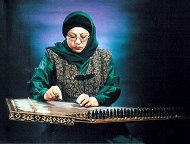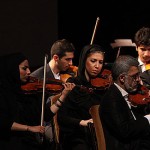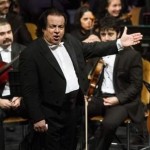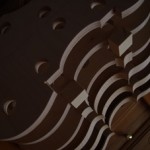
Translated by Mahboube Khalvati
In the world music culture, there are instruments which were traditionally associated with a certain gender. It remains disputable to what extent these gender-based perceptions have been logical and scientific. For example, as playing wind instruments need more breath strength and the public opinion believe that men have stronger breath compared to women, these instruments are predominantly a male domain. Harp is also considered a female instrument as the public opinion believe that women have finer fingers and can therefore better perform nuances and delicate techniques on the instrument.
It is also true about Qanun. Interestingly enough, a review of the history of the Iranian music proves that more men are more among the virtuous players of Qanun than women.
Six decades ago, Rahim Qanuni who had learnt Qanun from Arabs started teaching Qanun to Iranians. After him, Jalal Qanun plays the instrument in an Arabic style. However, Mehdi Fattah (1909 – 1996) started to officially and academically re-introduce the instrument.
Mehdi Meftah was a renowned violinist who had also started Qanun lessons under an Arab instrumentalist. He, therefore, considered a serious revival of this instrument in Iran as he believed that Qanun was an Iranian instrument which was hijacked by Arabs (it is worth mentioning that some researchers believe that the Iranian scholar Abu Nasr al-Farabi (14 December, 950 and 12 January, 951) had invented the instrument).
Mehdi Meftah went to Iraq in 1957 in order to take lessons on different methods of playing Qanun under Arab maestros; after returning to Iran Meftah started teaching the instrument in music conservatory (as the students’ second instrument).
So far, all great players of Qanun were men. So, when does women’s predominance over the instrument begin?
Meftah’s method of teaching the instrument was an Arabic method. Being talented, Simin Aqa Razi and Maliheh Saeedi were Meftah’s students who excelled at performance compared to the maestro.
After the emergence of TV in the society and broadcasting music programmes which attracted the attention of many arts lovers, solo Qanun performance or Qanun performance in accompaniment of the Iranian orchestra were aired frequently which majorly included performances by Aqa Razi and Saeedi.
Frequent reruns of Simin Aqa Razi’s solo performances (who was exactly ten years older than Saeedi), made the sound of this instrument even more popular and; therefore, the image of a woman Qanun player was imprinted on the minds of the public (like the ancient image of the women harpists).
The beauty and the gracefulness of Qanun in the hands of a woman soloist was a great motivation for young women to choose this instrument as their main one and this is the reason that even until today the most prominent players of Qanun are women.









